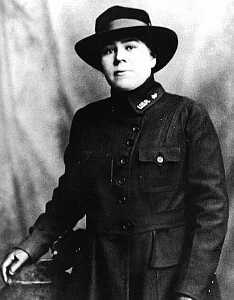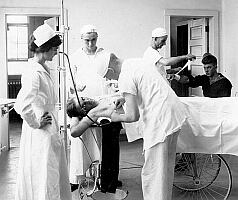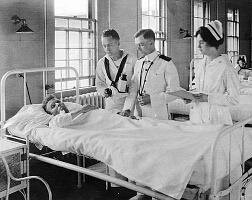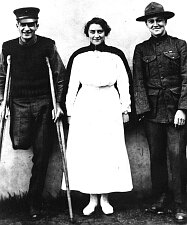Navy Nurses during World
War I
.
Mobilization
.
On the 6th of April 1917, the United States
under President Wilson declared war on Germany. Now, America had to mobilize
for war as fast and effectively as possible.
The Navy Nurse Corps numbered 160 members
at that time. A few days later, the Secretary of the Navy authorized the
Surgeon General to appoint Reserve Nurses as permitted by the 1908 Act
that established the Navy Nurse Corps.
.
Soon, the first nurses were enrolled in the
Naval Reserve Force (USNRF). By July, 155 USNRF nurses were already on
active duty. Additional reserve nurses were provided by the American Red
Cross that acted as reserve pool for the Army and Navy in emergency. Between
6 April 1917 and 3 March 1921 (the official end of American participation
in hostilities and war-related occupation duty) a total of 1,835 nurses
served in the Navy Nurse Corps. 327 were on duty outside the USA. Without
the needs of the major battlefields after the armistice, the personnel
strength of the NNC started to drop in 1919.
.
The photograph on the right side,
taken 1918, presents Navy Nurse Anna Keisur in her duty uniform. The initials
on her uniform collar read "USR (for "United States Reserve). She
was one of the many reserve nurses that did active duty during WWI. |
.. |

|
.
Strength of the Navy Nurse
Corps
1917-1921
|
.. |
| Year... |
Numbers |
| 1917 |
345 |
| 1918 |
1,386 |
| 1919 |
1,024 |
| 1920 |
533 |
| 1921 |
470 |
|
.
(The numbers for the statistic
were derived from the Bureau of Naval Personnel
Annual Report, Navy and Marine
Corps Military Personnel Statistics, 30 June 1960.)
.
Duties of Navy Nurses
.
Besides caring for the sick, their most important
jobs were to work as instructors and supervisors of hospital corpsmen who
had to be prepared for their nurse duties in combat areas. The number of
Naval Hospitals within the continental United States to whom Navy Nurses
were appointed was increased. In 1918 there were 25 hospitals, as well
as several smaller facilities. In comparison, Navy Nurses served at 6 Naval
hospitals inside the USA, at the beginning of 1911.
.

|
... |
.
|
| This WWI photograph shows hospital
corpsmen cleaning and dressing wounds supervised by a Navy Nurse in the
U.S. Naval Hospital, New Orleans (Louisiana). |
|
This picture from 1919
taken at the U.S. Naval Hospital, Chelsea (Massachusetts) shows a Navy
surgeon, a Navy Nurse and a hospital corpsman examining a patient. |
.
Serving Overseas
.
 Nurses aboard the transport ship USS
Leviathan during a World War I Atlantic crossing. The nurses are dressed
in rubber survival gear.
Nurses aboard the transport ship USS
Leviathan during a World War I Atlantic crossing. The nurses are dressed
in rubber survival gear. |
.. |
In September 1917, the first nurses were sent
overseas to Europe. In French Brest they helped to set up the first Naval
Base Hospital under extremely difficult conditions. The medical personnel
had to deal with an old low standard building and missing equipment. The
incoming patients often were badly injured. Horrible suffering victims
of mustard gas attacks were treated. The situation for the nurses developed
dangerous when the hospital faced enemy attacks like night raids as well
as some day raids. |
.
In 1918-1919, the influenza pandemic added
additional suffering and thousands of deaths to the war destruction. Actually,
half of the American soldiers who died in Europe fell to the influenza
virus and not to the enemy. The influenza pandemic circled the globe and
infected about one-quarter of the US and one-fifth of the world population.
An estimated 675,000 Americans died of influenza. This most devasting epidemic
taxed all medical staff to the limit, on the battlefields as well as on
the homefront.
.
Next to France, Navy Nurses were stationed
in Scotland and Ireland. They were assigned to all of the 5 European Base
Hospitals that the Navy set up during the war. Almost 300 nurses served
in Europe during WWI.
.
The photograph on the right side,
taken 1918, shows nurses stationed at the U.S.Naval Base Hospital Number
Two in Strathpeffer, Scotland. |
... |
 |
.
Some Navy Nurses worked on overseas stations
far away from the European war zone. First of all, they continued their
work at the already established stations in the Pacific area: Canacao,
Guam and Tutuila. In 1917, Navy Nurses started their duty at St. Thomas
and St. Croix on the Virgin Islands located in the Caribbean. In 1918,
Port au Prince (Haiti) was added. Again, the nurses helped to build up
training schools for native women to teach them nurse tasks. In April 1919,
Navy Nurses received their first order for duty at the Naval Hospital in
Yokohama, Japan.
.
 |
.. |
After the armistice, in December 1918, Navy
Nurses were assigned to medical duty aboard Navy ships to accompany American
troops back home from the war in Europe. A year later, nurses were also
aboard transport ships when prisoners and internees were returned to Europe.
.
The picture on the left side shows
two Navy Nurses aboard the transport ship USS George Washington
in December 1918. |
.
Acknowledgement
.
The Navy Nurse Corps clearly proved its value
for the Navy during this war. A couple of Navy Nurses received awards and
citations as acknowledgement of their brave performance during World War
I.
.
For example, 4 Navy Nurses were awarded with
the Navy Cross. One of them was Lenah S. Higbee, Superintendent of the
Navy Nurse Corps. The other three who had died from Influenza were awarded
posthumously. Two nurses who belonged to the Sacred Twenty received Navy
Letters of Commendation. Two others received Army Letters of Commendation
because of their extraordinary service in France. Despite several days
of enemy attacks they cared for the wounded with devotion, courage and
self-sacrifice in a field hospital where they repeatedly refused to rest. |
... |

.
The WWI period photograph shows a Navy
Nurse with two U.S. Marines. The solider on the left has lost his right
leg, while the one on the right side has lost his right arm. Caring for
the war wounds of the returning soldiers was an important job for nurses
after the end of war. |
.
During the official American war period between
April 1917 and March 1921, 36 Nurses died while in service. 16 were Reserve
Nurses, 15 USNRF Nurses and 5 Regular Navy Nurses. More than half of the
deaths were caused by Influenza. No nurse died as result of enemy action.
.
.
[ I. Development ] [
II. Facts about the NNC ] [ III. Uniforms
] [ IV. Sources
]
|
